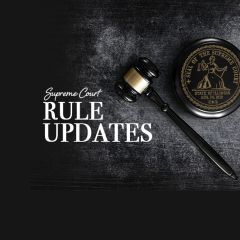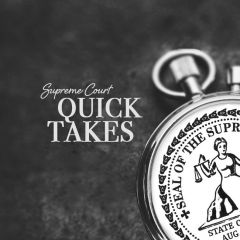The Illinois Supreme Court’s Volunteer Pro Bono Program for Criminal Appeals recently expanded statewide to include cases in all five appellate districts.
ISBA members, sign up to receive The Bar News' biweekly e-newsletter by emailing emailpreferences@isba.org
-
December 11, 2020 | Practice News

-
December 9, 2020 | Practice News
 The Illinois Supreme Court has amended Rules 529, 530, and 531, by adding the following language to each Rule: “Per the Act, only one scheduled assessment shall be applied regardless of the number of citations issued and prosecuted together.”
The Illinois Supreme Court has amended Rules 529, 530, and 531, by adding the following language to each Rule: “Per the Act, only one scheduled assessment shall be applied regardless of the number of citations issued and prosecuted together.” -
December 9, 2020 | Practice News
 Chief Justice Anne M. Burke and the Illinois Supreme Court announced today the approval of new Rule 14, which will facilitate the expansion of text messaging in Illinois courts by authorizing any Illinois court or county clerk to implement a text message notification program. New Rule 14 is effective immediately. The Illinois Supreme Court Rules can be found online.
Chief Justice Anne M. Burke and the Illinois Supreme Court announced today the approval of new Rule 14, which will facilitate the expansion of text messaging in Illinois courts by authorizing any Illinois court or county clerk to implement a text message notification program. New Rule 14 is effective immediately. The Illinois Supreme Court Rules can be found online. -
December 9, 2020 | CLE
 Join us from noon until 1 p.m. on Thursday, January 7 for "Illinois’ Secure Choice Act: Requirements & Penalties for Retirement Plans." Get the information you need to effectively advise your clients on how the Illinois Secure Choice Act fills a void for employers who don’t want to administer their own retirement plan for employees. Corporate law attorneys, employee benefits lawyers, general practitioners, and any attorney who advises companies on the employment law aspects of their business who attend this online seminar will better understand: what the Illinois Secure Choice Act is and it’s requirements; the financial penalties for not making the Secure Choice Savings Program available to employees if a retirement plan is not being offered; how the program helps Illinois employees save for retirement and avoid living their retirement years in poverty; how the Secure Choice Act Program was implemented; the number of Illinois citizens who have enrolled in the program so far, as well as the plan assets of participants; and the potential legal problems the program could face.
Join us from noon until 1 p.m. on Thursday, January 7 for "Illinois’ Secure Choice Act: Requirements & Penalties for Retirement Plans." Get the information you need to effectively advise your clients on how the Illinois Secure Choice Act fills a void for employers who don’t want to administer their own retirement plan for employees. Corporate law attorneys, employee benefits lawyers, general practitioners, and any attorney who advises companies on the employment law aspects of their business who attend this online seminar will better understand: what the Illinois Secure Choice Act is and it’s requirements; the financial penalties for not making the Secure Choice Savings Program available to employees if a retirement plan is not being offered; how the program helps Illinois employees save for retirement and avoid living their retirement years in poverty; how the Secure Choice Act Program was implemented; the number of Illinois citizens who have enrolled in the program so far, as well as the plan assets of participants; and the potential legal problems the program could face. -
December 8, 2020 | Practice News
 On December 4, 2020, after his November 3, 2020 election, Justice Neville, the second African American to sit on the Illinois Supreme Court, was sworn in by Chief Justice Anne M. Burke, with his wife and staff in attendance.
On December 4, 2020, after his November 3, 2020 election, Justice Neville, the second African American to sit on the Illinois Supreme Court, was sworn in by Chief Justice Anne M. Burke, with his wife and staff in attendance. -
December 7, 2020 | Practice News
 In their December 2020 Illinois Bar Journal article, attorneys Andrew R. Schwartz and John Cerney present the following scenario: Without first consulting its lawyers, your firm’s major client, Hapless Client, LLC, entered into a horrible one-sided contract with Sketchy Business, Inc. To make matters worse, Sketchy just filed a contract claim against Hapless to enforce that contract, and Sketchy’s complaint seeks massive damages that could put Hapless out of business permanently. An interview with Hapless confirms the truth of the essential allegations of the complaint. Since the complaint states a viable claim, a motion to dismiss will fail. Litigation might buy Hapless some time, but Sketchy will likely win on summary judgment. Settlement appears doubtful: Sketchy knows the strength of its case, and its settlement demand exceeds Hapless’ ability to pay. You know this desperate situation will require creative thinking and, lo and behold, your research about Sketchy shows that it has a long and colorful history in the courts, including an unsatisfied adverse judgment in favor of J. Creditor, LLC. Here, a rather unusual strategy presents itself: Purchase J. Creditor’s judgment against Sketchy. With that judgment, Hapless can then seize Sketchy’s claim, i.e. its “chose in action” against Hapless. Schwartz and Cerney outline precisely how this maneuver works (and is one based on the authors’ real-life experience).
In their December 2020 Illinois Bar Journal article, attorneys Andrew R. Schwartz and John Cerney present the following scenario: Without first consulting its lawyers, your firm’s major client, Hapless Client, LLC, entered into a horrible one-sided contract with Sketchy Business, Inc. To make matters worse, Sketchy just filed a contract claim against Hapless to enforce that contract, and Sketchy’s complaint seeks massive damages that could put Hapless out of business permanently. An interview with Hapless confirms the truth of the essential allegations of the complaint. Since the complaint states a viable claim, a motion to dismiss will fail. Litigation might buy Hapless some time, but Sketchy will likely win on summary judgment. Settlement appears doubtful: Sketchy knows the strength of its case, and its settlement demand exceeds Hapless’ ability to pay. You know this desperate situation will require creative thinking and, lo and behold, your research about Sketchy shows that it has a long and colorful history in the courts, including an unsatisfied adverse judgment in favor of J. Creditor, LLC. Here, a rather unusual strategy presents itself: Purchase J. Creditor’s judgment against Sketchy. With that judgment, Hapless can then seize Sketchy’s claim, i.e. its “chose in action” against Hapless. Schwartz and Cerney outline precisely how this maneuver works (and is one based on the authors’ real-life experience). -
December 4, 2020 | Practice News
 The Illinois Supreme Court handed down five opinions on Thursday, December 3. They included opinions in two criminal cases and three civil cases. In People v. Reed, the court answered the question of whether a guilty plea prevents a defendant from later asserting an actual innocence claim under the Post-Conviction Hearing Act. In People v. Knapp, the court considered a case in which the defendant, after his attempted murder conviction was affirmed on appeal, filed a post-conviction petition that alleged that his waiver of his right to testify was neither knowingly nor voluntarily made. In State Farm Mutual Automobile Insurance Co. v. Elmore, the court considered the meaning and enforceability of a “mechanical device” exclusion in an automobile insurance policy that covered a grain truck used in a grain farming operation. In Gillespie v. Edmier, the court agreed that the defendant manufacturer was not entitled to summary judgment on the plaintiff’s strict product liability claims. In People ex rel. Lisa Madigan v. Stateline Recycling, LLC, the court reviewed a contempt order and remanded a case involving a civil enforcement action brought by the Attorney General under the Illinois Environmental Protection Act.
The Illinois Supreme Court handed down five opinions on Thursday, December 3. They included opinions in two criminal cases and three civil cases. In People v. Reed, the court answered the question of whether a guilty plea prevents a defendant from later asserting an actual innocence claim under the Post-Conviction Hearing Act. In People v. Knapp, the court considered a case in which the defendant, after his attempted murder conviction was affirmed on appeal, filed a post-conviction petition that alleged that his waiver of his right to testify was neither knowingly nor voluntarily made. In State Farm Mutual Automobile Insurance Co. v. Elmore, the court considered the meaning and enforceability of a “mechanical device” exclusion in an automobile insurance policy that covered a grain truck used in a grain farming operation. In Gillespie v. Edmier, the court agreed that the defendant manufacturer was not entitled to summary judgment on the plaintiff’s strict product liability claims. In People ex rel. Lisa Madigan v. Stateline Recycling, LLC, the court reviewed a contempt order and remanded a case involving a civil enforcement action brought by the Attorney General under the Illinois Environmental Protection Act. -
December 4, 2020 | CLE
 Join us from noon until 2 p.m. on Thursday, December 17 for in-depth look at the dispute resolution options available to parents, students, and school districts in special education matters. School attorneys, general practitioners, and education counsel with all levels of practice experience will benefit from the information provided by our three attorney speakers, all of whom has significant experience in this field. A discussion on recent developments, legislation, and COVID-19 measures are is also included.
Join us from noon until 2 p.m. on Thursday, December 17 for in-depth look at the dispute resolution options available to parents, students, and school districts in special education matters. School attorneys, general practitioners, and education counsel with all levels of practice experience will benefit from the information provided by our three attorney speakers, all of whom has significant experience in this field. A discussion on recent developments, legislation, and COVID-19 measures are is also included. -
December 1, 2020 |
ISBA News
ISBA President Dennis Orsey will host a Town Hall event at 4 p.m. on Thursday, December 10 to speak about current issues facing the profession and to foster a discussion with members about the pandemic and practice of law. The Town Hall event, which is part of the Joint Midyear Meeting, will be hosted via Zoom and is open to all ISBA members at no cost.
-
December 1, 2020 |
ISBA News
Every year, the Illinois State Bar Association presents awards to recognize individuals and law firms for their commitment and service to the profession, their communities, and the association. Award recipients are selected through a nomination process, and members are encouraged to nominate persons who meet the criteria for each award. Please submit the online nomination form, available following the links below, for the following awards no later than March 5, 2021.

